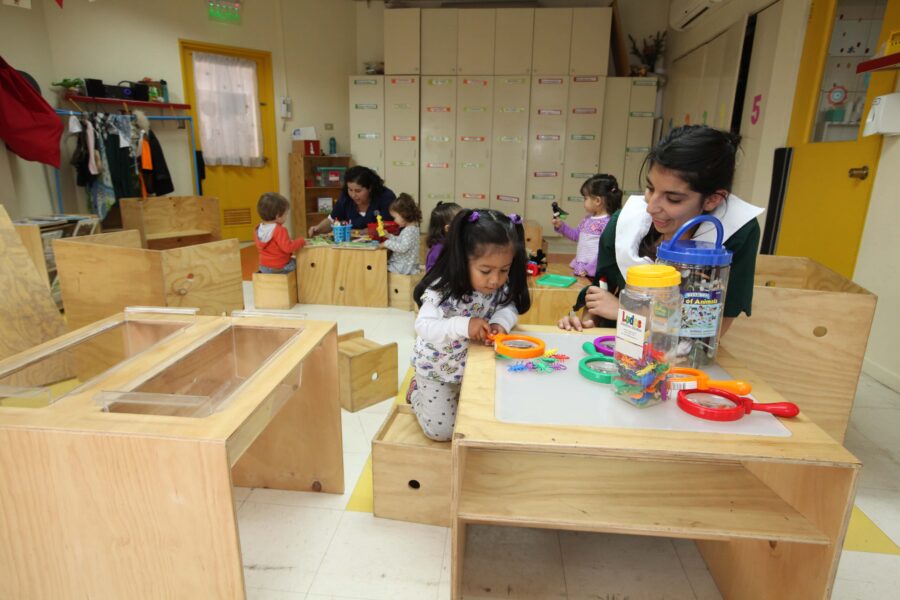New UC book investigates the link between the physical space of kindergartens and the promotion of learning and skills of its students
August 18 2016
“Pedagogies to inhabit the kindergarten. Constructions from the modeling of the physical learning environment” is the name of the new title from Ediciones UC that investigates the relationship between physical environments and learning opportunities in preschool education, and which was written by UC academics Cynthia Adlerstein (Education), Patricia Manns (Design and Alberto González (UC design).
The new book compiles evidence, methodology and findings from several years of research by the project MAFA (Modeling of Physical Learning Environments), and his presentation was headed by the rector of the UC, Ignacio Sánchez; the academic of Education Lorena Medina, the expert in Architecture, Design and Urban Studies, Mario Ubilla, and the director of UC Editions María Angélica Zegers.
Also participating in the event as panelists were the Undersecretary of Early Childhood Education, María Isabel Díaz; the academic from ORT University (Uruguay) Paula María Cardellino; the academic from the Faculty of Education and philosopher of pedagogy Luis Flores and the academic from the UC School of Design, Hugo Palmarola; in a panel that was moderated by journalist Cristóbal Edwards, from the UC Faculty of Communications.
During your speech, the academic director of the MAFA project –Cynthia Adlerstein, pointed out that "physical learning environments cannot be thought of more in an adult-centric way and with obsolete regulatory furniture (...) We wanted to found a new territory with children (and not for children), empowering them to decide on their space, so that they co-construct places of learning and life”.

The book, for the academic, is a new state where children and adults are seen as citizens; "where they authentically decide and influence their ways of learning, their lives, their coexistence with others (...) The book recounts the pedagogies that today make it possible for children to position themselves, from their childhood, as social actors”, he defined.
Panelists: Espacio is the third educator
During his speech at the panel of experts, Professor Hugo Palmarola maintained that the book presented deals with the relationships that are built from its content. “Design fulfills a social role since it seeks a relationship with good treatment, collaboration, and co-creation over the competition model that prevails today,” he commented, adding that with the text, “UC recovers its tradition of design to fulfill a social purpose, whose maximum expression was the social housing of the 60s”.
His words were joined by the comment of the Undersecretary of Early Childhood Education, María Isabel Díaz. For her, "the space is not just a classroom; space also matters, it is also contained. We currently have a restricted notion of pedagogical practice in preschool age. This book challenges different actors to resignify and build significant and relevant pedagogies”.
-The educational space is conceived beyond the curricular, it is also the physical environment that should favor play, exploration, learning and interaction. Children must appropriate their space and promote the achievement of their learning (...) It is about building a habitat from their own experiences. We don't want to colonize childhood with our adult languages,” said the authority.
La Uruguayan Paula Maria Cardellino He agreed on the role of space as an agent that mobilizes and promotes certain skills and competencies among those who inhabit it, and he congratulated the presence of the Government and the Academy around a school design project. “That is something that is far from happening in Uruguay,” he admitted.
UC Education Professor Luis Flores was the last commenter, noting that “the book does not redefine space: it reformulates it. We do not question that spatial geometry in which we were formed. These kindergartens, on the other hand, go from a monodisciplinary idea to an interdisciplinary one. The focus is on doing, playing, interpreting. Today's adults never had that opportunity, we were raised in normative spaces that reproduce docile bodies." since "in the school system we stop playing and stop asking, and we dedicate ourselves to memorizing".
MAFA project for better gardens
Today's classrooms have with little mobility space for preschoolers to play and discover space; and the furniture (tables and chairs) are not designed with children under 5 in mind, but rather with adults due to their weight. The Chilean furniture regulation -which establishes the minimum parameters- is out of date and does not meet the world standards of OECD member countries (the regulation has not been modified in more than 40 years).
For these reasons, the classrooms of kindergartens in the country are obsolete. Not only would they not contribute to children's learning, but they even hindered it. In this sense, the MAFA project was implemented as a solution in 20 kindergartens nationwide (among them 10 dependent on JUNJI) in which it places the pedagogical teams together with the children, as inhabitants of a flexible physical educational environment, significant for learning, empowering autonomy, promoting well-being and universal accessibility.
According to Cynthia Alderstein, the MAFA project seeks “model physical environments that increase and redistribute learning opportunities in public kindergartens”. At the same time, he added that from the Catholic University they are proud to contribute to early childhood pedagogy. with cutting-edge technological research which includes the use of a virtual platform for modeling educational environments, a set of furniture for kindergartens and modeling material so that the children themselves participate in the design of the room, but also the focus is placed on the political and social demands of the country's children and educators.
Text: Francisco Zabaleta, Faculty of Education UC
